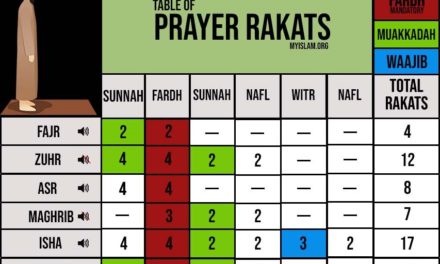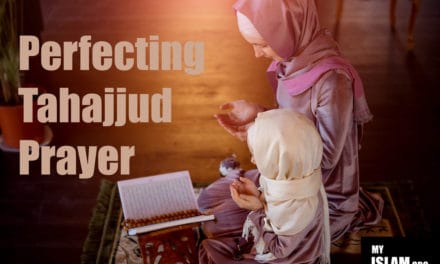
Special Events

Salah During Travel (Qasr)
Praying 5 times a day is an obligation upon Muslims. However, Allah has allowed His servants to shorten their Salah during travel.
1- Why Should We Follow Qasr Salah During Travel?
The Messenger of Allah (S.A.W.) said,
“Verily, Allah loves for you to take His concessions , just as he dislikes you to be disobedient.” (Musnad Ahmad: 5832)
The shortening of prayers is mentioned in the Quran and is a confirmed Sunnah of Prophet Muhammad (S.A.W.):
“And when you travel throughout the land, there is no blame upon you for the shortening Prayer” (Quran 4:101, An-Nasai: 457)
Hence, for travelers, it is permissible to shorten those Prayers that consist of 4 Rakat to only 2 Rakat (i.e. only Fardh Prayer of Dhuhr, Asr & Isha Salah).
2- Opinion of Different Fiqh:
According to Imam Shafii (R.A.) and Imam Ahmad bin Hanbal (R.A.), Reduction in the Prayer is not obligatory but merely optional. However, it is better to shorten it.
Imam Abu Hanifah (R.A.) considers ‘Reduction in Prayer'’ as obligatory (Wajib) during travel .
3- Conditions for Qasr:
Travelling Distance
According to Imam Abu Hanifa, the minimum required distance for a person to be considered a traveler is when he or she intends to travel for 48 miles (80 kilometers approx) from his/her Waṭan-e-Aṣli (Original Hometown).
Imam Shafi'i, Imam Ahmad bin Hanbal and Imam Malik fixed this distance at 55 miles approx (88 km approx).
Shortening of the prayers commences once a person leaves the city limits and ceases when they re-enter the city limits.
Period/Time
There is considerable scholarly disagreement on this matter from three days to four and to fifteen days.
Traveler-status is the intention to stay at the place of arrival for a period of:
Less than Fifteen (15) days [Hanafi]
Less than Four (4) days [Hanbali, Maliki and Shafii] - (Days of arrival and departure are not included)
4- How to do Taqseer (shortening of Prayers):
During travel, only Salah with 4 Rakat Fardh is to be shortened, i.e. Dhuhr, Asr & Isha. Travelers should offer 2 Rakat instead of 4 Rakat of the mentioned Salahs.
However, 2 Rakat Fardh of Fajr and 3 Rakat of Maghrib Salah must be offered in full as you cannot cut 2 or 3 Rakat Fardh Salah in half.
When on a journey, the Prophet (S.A.W.) used to offer, without fail, 2 Sunnah Rakat of Fajr Prayer and 3 Rakat Witr with Isha Prayer . So these two should be offered even during traveling.
Remember that these rules are only for a person who is traveling and offering individual Salah. If the traveler is praying in congregation then he must follow the Imam and offer the full Salah.
The Quran, written centuries ago, contains profound hints at future discoveries. It includes scientific facts that surpass the knowledge of anyone who lived in the 7th century. This serves as compelling evidence of the divine nature of the Quran.
This year, Nisf Shaban (Shab-e-Barat) will start after the sunset of Tuesday, March 7th, 2023.
Isra wal Meraj is a journey of faith and revelation that the Prophet Muhammad (S.A.W.) took from Makkah to Jerusalem and then to the 7th Heaven.
Isra and Miraj (The Night Journey) is miraculous journey that Prophet Muhammad (S.A.W.) took in one night from Makkah to Bait al-Maqdas and then an ascension to the heavens.
* user name and email shouldn't be left empty

- Give Your Zakat

When am I Considered a Traveller? (Shafi’i)
Answered by Shaykh Shuaib Ally
Question: Assalam alaykum,
When am I considered a traveller and when can I shorten my prayers?
Answer: Assalamu ‘Alaykum,
I pray that you are well.
In brief, a person is considered a traveler and can shorten and combine their prayers when they:
-Are not traveling for a purpose that is impermissible -Are performing prayers that occur within the travel period -Have passed one’s city’s limits, and will be traveling from there for a distance longer than about 79-80 km -Have not reached the place they have decided to reside, or will not be staying at their destination for four days or more, not including the day they arrive and the day they leave -Are aware of the permissibility of shortening their prayers -Are not following in their pray someone completing their prayer in full -Have intended to shorten their prayers at the beginning of their prayer -Have done three things to allow for combining prayers in the time of the first prayer: prayed in order; intended to combine prayers at some point during the first prayer; prayed the second prayer after the first prayer without a long break between the two.
Other details can be found in books of law, as well as this course on Shafiʿi fiqh, which deals with the above in some detail: Islamic Law for Seekers (Shafi`i): Worship
Wassalam, Shuaib Ally
Photo: Med Rizki ZNIBER
Related Posts
How does islamic banking differ from a regular home loan, is my income unlawful if some of my employer’s wealth is earned unlawfully , should i make up for breaking sunna acts of worship in the shafi‘i school, does suicide due to depression guarantee hellfire.
Accessible to all, supported by you
Learn With Us
- Course Catalog
- Live Schedule
- Student Login
Seek With Us
- Ask a Question
Get to Know Us
- Our Reports
- Privacy Policy
Get Free Courses & Prophetic Guidance in Your Inbox
Email Address *
Shortening and Combining Prayers While Travelling (Qasr Salat)
Posted by Ahmed Abdulla | Prayer

How Far Does One Have To Travel To Pray Shortened Prayer?
There is no hadith or mention in the Quran on how far one must travel that specifies the need for Qasr Salat. The jurists argue, the minimum required distance should approximately 55 miles (around 88.7km). This is around four burud (an antiquated unit of distance representing two days of travel with a Camel).
The shortening of the prayer can also commence once he has left his village or city.
How Many Days Can You Offer the Shortened Salah?
There is a difference of opinion as to how many days you can pray the shortened salah as this is not specified in the hadith. According to the Hanafi Fiqh, it’s permissible for a Muslim to pray shortened prayer if he plans to stay less than 15 days. Beyond 15 days he is believed to be a resident and should offer the regular fardh rakats.
If he planned on staying less than 15 days but due to some unforeseen circumstance, for example delays or flight cancellations, he should keep Qasr salat as long as conditions haven’t changed and he is not able to return home. This can last days, weeks or even years as long as it is out of the traveller’s control.
Praying In Congregation
It is still recommended that the traveller should pray in congregation. If he attends a local masjid he must follow the imam and offer the full salat. If he is elected to lead the congregation with local residents he can offer the shortened prayer but should advise the followers so they make the proper niyyah that they will be offering the shortened prayer with the Imam.
On Combining the Prayers
Most jurists are in agreement that the person travelling can combine the prayers. Specificially, Zuhr and Asr can be combined and Maghrib and Isha can be combined. [5,6]
There are two options when combining the prayers, you can either advance Asr and pray at the time of Zuhr or pray Zuhr delayed at the time of Asr. Same for Maghrib and Isha. The only prayer you can not combine if Fajr with Zuhr or Isha with Fajr.
References:
[1] It was narrated that ‘Umar said: “The prayer while traveling is two Rak’ah, and Friday is two Rak’ah, and ‘Eid is two Rak’ah. They are complete and are not shortened, as told by Muhammad (ﷺ).” Sunan Ibn Majah Grade: Sahih (Darussalam)
[2] Narrated Anas: We stayed (in Mecca) for ten days along with the Prophet (ﷺ) and used to offer shortened prayers (i.e. journey prayers). Sahih Al-Bukhari
[3] Narrated Ibn Abbas: The Prophet (ﷺ) once stayed for nineteen days and prayed shortened prayers. So when we travel led (and stayed) for nineteen days, we used to shorten the prayer but if we traveled (and stayed) for a longer period we used to offer the full prayer. Sahih Al-Bukhari
[4] It was narrated that Ya’la bin Umayyah said: “I said to ‘Umar bin Al-Khattab: ‘There is no sin on you if you shorten salah and if you fear that the disbelievers may put you in trial (attack you). But now the people are safe.’ ‘Umar said: ‘I wondered the same thing, so I asked the Messenger of Allah (ﷺ) about that and he said: This is a favor from Allah (SWT) to you, so accept His favor.” Grade: Sahih (Darussalam) Sunan an-Nasa’i
[5] It was narrated from Ibn ‘Umar that if the Messenger of Allah (ﷺ) was in a hurry to travel, he would combine Maghrib and ‘Isha’. Sunan An Nasai Grade: Sahih (Darussalam)
[6] It was narrated from Mu’adh bin Jabal that the Prophet (ﷺ) combined the Zuhr and ‘Asr, and the Maghrib and ‘Isha’ when traveling during the campaign of Tabuk. Sunan Ibn Majah Grade: Sahih (Darussalam)
Related Posts

67+ Salah Quotes in Quran (verses in Quran About Islamic Prayers)
April 9, 2020

What are twelve Rakat Sunan Al Rawatib? (Sunnah Mu’akkadah Prayers)
May 5, 2020


Does The Quran Only Mention 3 or 5 Daily Prayers?
April 7, 2020

How To Perfect Your Tahajjud Salah (Night Prayer)
April 28, 2020
13 Comments
Assalamu alaykum wa rahmatullah. The question i have is how many rak’ats are we to do when joining Zuhr and Asr or Maghrib and Isha? Are we to pray them as one single prayer or separate? Jazakallahu khairan.
No you should pray separate
Can I pray ( sitting position) while traveling.
Salam alikom! My question is a bit off topic but if I am on the train traveling home from school, and the distance is approxemetly 30-40 km. If at that moment I have to pray because of the time running out. Should I pray the sunnah or not? Jazakalla khairan
Aoa. If I visit my uncle in another city with my family for less than 15 days, then what is the ruling on qasr prayer? I mean I visit my uncle just to enjoy the holidays(like we do shopping, picnic and even go for medical check-up during these days). Should we offer qasr or complete prayer?
Salaam, I travel to work ~135 KM daily . Will the Qasr apply for prayers during the day?
If i stay in hotel more than one week or two weeks should i concerned my self in safar in this case i can pray less rakat
What if my zuhr asr time gets qaza Can I offer the same Jammu qasr after the time or should I pray zuhr and asr seperately?
Salaam. as far as i can gather, there is no clear cut answers from our experts. some say 10 days others 19 days out of your city. the last mentioned is more acceptable to me , but i am no expert. if you cannot stand in prayer then sit when travelling. If some one can be more specific in answering, some AL hadith WOULD SUFFICE. JazakAllahkir.
Assalaam Alaikum, Can I combine Isha with Fajr?
Hi, what about if someone got sick, is there a hadith talking about praying only 2 rakats instead of 4
Asalam alaykum warahmatullah wabarakatuh…. if travelling and you see that the dhuhr and asr prayers will be performed mid journey, is it advisable to pray the shortened prayer just after fajr salat before commencing the journey??? Jazakhallahu khair…
Salam alaikum, please I have two questions. 1. I traveled to a place and could not get a place to pray till I return back home .It’s a same day trip . When I get home will I pray all my salat in full or will it be shortened . 2. Is there a reward for praying kasar e.g I traveled to my friend’s place and planned to stay for 2 days. If I have to pray kasar is there a reward for that or can I choose to pray my salat in full .
Leave a reply Cancel reply
Your email address will not be published. Required fields are marked *
Support the site?
“Take on only as much as you can do of good deeds, for the best of deeds is that which is done consistently, even if it is little.” – Sunan Ibn Majah 4240
Need more info? Read our 2023 Annual Report
10 Reminders for Last 10 Days of Ramadan
Delivered everyday directly to your inbox.
Sign up today!
Jazakallahu Khairan, you've successfully subscribed!
- Albalagh.net
- AnswersToFatawa
- Arij Canada
- Askimam.org
- Askmufti.co.za
- AskOurImam.com
- CouncilofUlama.co.za
- Darulfiqh.com
- Darulifta Azaadville
- Darulifta Deoband Waqf
- Darulifta-Deoband.com
- Daruliftaa.com
- DaruliftaaMW.com
- DaruliftaaZambia.com
- DarulIftaBirmingham
- Darulihsan.com
- DarulUloomTT.net
- Fatwa-TT.com
- Fatwa.org.au
- FatwaCentre.org
- HadithAnswers.com
- IslamicPortal.co.uk
- IslamicSolutions.org
- Jamia Binoria
- Mahmoodiyah
- Mathabah.org
- Muftionline.co.za
- Muftisays.com
- MuslimaCoaching.com
- Seekersguidance.org
- ShariahBoard.org
- Tafseer Raheemi
- TheMufti.com
- ZamzamAcademy.com
- BinBayyah.net
- Darul Iftaa Jordan
- Shafiifiqh.com
- HanbaliDisciples.com
- TheHanbaliMadhhab.com
- Ask Question
- Lailatul Qadr

Home » Hanafi Fiqh » Qibla.com » Evidences for the distance and time to be considered a traveller
Related Q&A
- For how long is a Traveler Allowed to Shorten and Combine Prayers?
- How to Calculate the Distance Between Two Cities to Know If I Am a Traveler?
- Traveller: The issue of distance within the city of residence or another city
- Becoming a traveller within city limits?
- What Is Considered to Be a City Boundary When Traveling?
- Can a Hanafi Combine Salah?
Evidences for the distance and time to be considered a traveller
Answered by Shaykh Gibril F Haddad
I am working with people who combine and shorten their prayers as soon as they leave the city limits. I, as a Hanafi, follow the Hanafi school and so do not do as they do. I do not repremand them although I think their practice odd. However, they often think I’m being extreme and causing fitna, they also claim Abu Hanifa’s opinion on this was weak. So that I can educate myself and them, could you please explain to me how the school derived the ruilings for the minimum distance to be considered a traveller and the duration of stay to be considered a resident. Also, is there a phenominen that hadith from The Prophet wont have been preserved on something that was commonly known and practiced? E.g. when standing after ruku, it appears every Muslim in history has left their arms by their side, but their appears non textual ‘proof.’

There are four issues in the question:
1. Proof for the minimum distance to be considered a traveller in the Hanafi School
The Musafir or traveller is the Muslim who goes out of his country aiming to reach another country lying at a distance of 88 kilometers or more.
The proof for this is derived from the hadiths which correlate three days’ travel at that time with the status of traveller:
– “The Prophet, upon him blessings and peace, allowed wiping on the leather sock [during ablution] for three days and nights for the traveller.” Sahih Muslim, mass-transmitted according to Imam al-Tahawi in Ma`ani al-Aathaar (1:150).
– In al-Bukhari and Muslim: “No woman travels for a period of three [i.e. three days and nights] except in the company of a mahram.”
Similarly, Malik narrated from Nafi`, from Ibn `Umar that the latter shortened the prayer in Khaybar, saying: “These are three qawasid, i.e. nights.” Sunan al-Bayhaqi (3:136). Likewise in the place called al-Suwayda’ near Madina on the way to Shaam, lying at a shorter distance than Khaybar. Muhammad, Aathaar (p. 34-35) with a sound chain per Ibn Hajar in Aathaar al-Sunan (2:62).
Another time, Ibn `Umar shortened his prayer after travelling to Reem, which lies at a much shorter distance yet. Ibn Hajar, Fath al-Bari (2:476).
The distance travelled at average speed, i.e. on foot and on camelback, over a period of three days with three nights’ rest *at that time* varies, however, it was assessed in the Madhhab as 48 Hashemite miles = 4 burud = 16 farsakh = 88.694 km.
Ibn Hajar in Fath al-Bari (2:466) mentions several reports that Ibn `Umar and Ibn `Abbas would shorten prayer for a distance of 4 burud.
2. The times from which to start shortening the prayer, and end shortening it
The traveller begins to shorten the prayer from the moment he passes the city limits on hiw way out and he resumes completing it from the moment he passes the city limits on his way in.
Abu Hurayra, may Allah be well-pleased with him, said: “I travelled with the Messenger of Allah, upon him blessings and peace, and with Abu bakr and `Umar, Allah be well-pleased with them. Each of them prayed two rak`as from the moment he left Madina and until he returned to it, both on the way and while residing in Makka.” Narrated by Malik cf. al-Ta`liq al-Mumajjad (1:563).
Abu al-Aswad al-Du’ali narrated that `Ali, Allah be well-pleased with him, left to travel out of Basra and prayed zuhr with four rak`as then said: “If we had passed this limit we would have prayed two rak`as.” That is, the country’s limits. Narrated by Abu Ya`la and al-Tabarani. Al-Bayhaqi said Abu Ya`la’s narrators were those of the Sahih. See also Nasb al-Raya (2:183).
`Ali ibn Rabi`a said: “We went out with `Ali ibn Abi Talib, Allah be well-pleased with him, toward al-Shaam and he prayed two rak`as throughout until we returned and saw al-Kufa. At the time of prayer they said: ‘Commander of the Believers, there is al-Kufa, shall we complete the prayer?’ He replied: ‘Not until we enter it.'” Sunan al-Bayhaqi (3:146)
3. The duration of stay to be considered a resident in the Hanafi School
Whoever travels to reach a country to stay in it less than 15 days, or does not intend to stay there 15 days even if he does stay there 15 days or more, must shorten the prayer from 4 to 2.
Anas, may Allah be well-pleased with him, said: “We went out with the Messenger of Allah, upon him blessings and peace, from Madina to Makka, and he prayed two rak`as throughout until we returned to Madina.” He was asked: “Did you stay in Makka for any length of time?” He replied: “We resided in it for ten days.” Narrated by al-Bukhari and Muslim.
Jabir said: “I campaigned with the Messenger of Allah, upon him blessings and peace, to Tabuk and he resided in it between 11 and 19 days, during which he never added to two rak`as until he returned.” Narrated by al-Bayhaqi in his Sunan (3:152).
`Abd Allah ibn `Umar, Allah be well-pleased with both of them, used to complete the prayer whenever he intended to reside 15 days somewhere. Narrated by Ibn Abi Shayba.
`Abd Allah ibn `Umar said, Allah be well-pleased with both of them: “When you travel and you decide to reside somewhere for 15 days, complete the prayer; but if you do not know when you will travel again, shorten it.” Narrated by Muhammad ibn al-Hasan in al-Aathaar. Ibn Hajar said in Aathaar al-Sunan that its chain was sahih hasan. Al-Tahawi narrated the same from Ibn `Abbas. See al-Zayla`i, Nasb al-Raya (2:185).
4. Leaving one’s arms hanging by the sides when standing after ruku`
There is no proof for grasping one’s hands together after ruku` in the prayer whatsoever. As you suggested, it is simply unthinkable that the entirety of the Sahaba, with their meticulousness and precision, would all forget mentioning such a repetitive detail about the First Pillar of Islam after Shahada.
The Prophet, upon him blessings and peace, grasped hands only in qiyam, i.e. standing while reciting the Qur’an, while the point after ruku` is not called qiyam in the texts but i`tidal, i.e. straightening oneself. Indeed, our liegelord `Ali, may Allah ennoble his face, said: “The Messenger of Allah, upon him blessings and peace, when he got up to pray, would say ‘Allahu akbar’ and place his right hand on his left wrist, remaining thus until he bowed, etc.” Narrated by al-Bukhari without chain in his Sahih, and others. Note that he said: “remaining thus _until_ he bowed,” i.e. no longer afterwards.
And Allah Most High knows best.
References: Al-Hadiyyat al-`Ala’iyya (p. 108-113). Al-Ghawji, Arkan al-Islam (1:350-352). Al-Saghurji, al-Fiqh al-Hanafi wa-Adillatuh (p. 276-285). Al-Tahanawi, I`la’ al-Sunan (7:269-322).
Was-Salam, GF Haddad
This answer was indexed from Qibla.com, which used to have a repository of Islamic Q&A answered by various scholars. The website is no longer in existence. It has now been transformed into a learning portal with paid Islamic course offering under the brand of Kiflayn .
Read answers with similar topics:
Random Q&A
The prayer for seeking rain, i am praying five times salah with jamat with the blessing of allah, and try to attach myself towards islam and i am trying to follow islam. today 19/june/05 after fajr pray i slept and i saw the dream. this is first time i saw this dream that the world is so much in trouble and i saw suddenly my all nails of hand become black, i told my sister or might be other that dajjal has appeared now and now so much people may get killed, i told them in dream that i have read that when all everyone’s nails become black then it means that dajjal is appeared and then i see my other people (my family nail also black). then some people ask me tell them about dajjal i tell them not to about otherwise he can hear as well and hurt you. i have a feeling in the dream that its appear far away from my native country (pakistan) and in dream i’m in pakistan. but one thing i told to the peoples that i mean that the time is come mehdii will kill dajjal and time is now near for success. i see someone fight as well., distribution of a deceased’s provident fund, what is the ruling regarding adoption of the nationality of a non-muslim country, only english, is it permissible to invest in a property fund and what is the zakat liability on such a fund, more answers….
- Missing Friday prayers due to being too far from a masjid
- Salat al-Istikhara
- Prayer: Does Crying Invalidate Wudu?
- Working in an insurance company
- Giving Salams By Mistake
- Wudu in Front of Others: Can I do tayammum? (And: wiping over regular socks)
Latest Q&A
- Is Makeup Allowed During Iḥrām?
- Do These Actions Formulate Disbelief?
- The Status of a Job Acquired with False Certification
- Can a Ḥanafī Resident Pray Behind a Shāfi’īe Traveller?
- Is it Permissible to Allow Wheelchairs in a Masjid?
- Is an Entry Fee at a Charity Event Considered Charity?
Privacy Overview
- en العربية ar English en اردو ur
How Many Days Can You Shorten Prayers?
Publication : 02-02-2006
Views : 198134
During the summer vacation, we went on a trip for twenty days, and during this time we shortened our prayers because the Sahabah (may Allah be pleased with them) went on trips for six months and shortened their prayers. Is this view correct? Do we have to make up the days that have passed?
Summary of answer
Contents Related
Qasr Prayer: For how many days?
Did the companions travel for vacations, should you make up the prayers that you shortened.
Praise be to Allah.
The majority of scholars are of the view that a traveller may avail himself of the concessions of travel so long as he is not staying in the place to which he has gone for four or more days , whether he travels for work, medical treatment, a vacation or any other reason.
Ibn Qudamah (may Allah have mercy on him) said: The well-known view of Ahmad (may Allah have mercy on him) is that the period during which the traveller must perform his prayers in full with the intention of staying is a period in which there are more than twenty-one prayers. And it was narrated from him that if he intends to stay for more than four days he must perform his prayers in full, but if he intends to stay less than that, he may shorten them . This is also the view of Malik and al-Shafi’i.” (Al-Mughni, 2/65)
It says in Fatawa al-Lajnah al-Daimah (8/109):
“The basic principle is that the traveller who is actually travelling is the one who is granted a concession allowing him to shorten the four-rak’ah prayers , because Allah says (interpretation of the meaning):
“And when you (Muslims) travel in the land, there is no sin on you if you shorten As-Salah (the prayer)” [al-Nisa 4:101]
And Ya’la ibn Umayyah said: I said to ‘Umar ibn al-Khattab (may Allah be pleased with him): “ ‘And when you (Muslims) travel in the land, there is no sin on you if you shorten the prayer if you fear that the disbelievers may put you in trial (attack you),’” He said: I wondered the same thing as you, and I asked the Messenger of Allah (peace and blessings of Allah be upon him) about it, and he said: “It is a charity that Allah has bestowed upon you, so accept His charity.” (Narrated by Muslim)
The one who stays in a place for four days and nights or less also comes under the ruling of the traveller who is actually travelling, because it is proven in the hadith of Jabir and Ibn 'Abbas (may Allah be pleased with them) that the Prophet (peace and blessings of Allah be upon him) came to Makkah on the fourth of Dhu’l-Hijjah for the Farewell Pilgrimage, and he (peace and blessings of Allah be upon him) stayed for the fourth, fifth, sixth and seventh, and he prayed Fajr in al-Abtah on the eighth day, and he shortened his prayers during those days. He had formed the intention to stay, as is well known. So everyone who travels and intends to stay for this length of time that the Prophet (peace and blessings of Allah be upon him) stayed, or less, may shorten his prayers. Whoever intends to stay longer than that should offer the prayers in full, because he does not come under the heading of a traveler.
But if a person stays for longer than four days during his trip and has not formed the intention to stay, rather he has resolved that when he has finished his business he will go back, like one who stays in a place to engage in jihad against the enemy, or has been detained by the authorities or by sickness, but he has resolved that when the jihad ends with victory or a peace treaty, or the sickness or enemy power that is keeping him there ends, or he sells all his goods and so on, he will go back, then he is regarded as a traveller, and he may shorten the four-rak’ah prayers, even if that period is long, because it is proven that the Prophet (peace and blessings of Allah be upon him) stayed in Makkah during the year of the Conquest for nineteen days, during which he shortened his prayers, and he stayed in Tabuk for twenty days to fight the Christians, and he led his Companions in shortened prayers, because he had not resolved to stay, rather his intention was to leave once he had finished his business.”
The Sahabah (may Allah be pleased with them) did not travel for a vacation for six months as mentioned in the question. Rather they would travel for jihad for the sake of Allah, or to seek knowledge, or to seek a halal provision, and other religious and worldly interests, such as Ibn ‘Umar (may Allah be pleased with him) who stayed in Azerbaijan for six months, and snow kept him from entering, and he shortened his prayers.
You do not have to make up the prayers that you shortened during this time, because it is possible that you may come under the category of travelling. The Standing Committee was asked about a person who was sent by Saudi to Germany, who stayed there for nearly one and half years and he shortened his prayers. They replied:
“You do not have to make up the prayers that you shortened or delayed or joined with other prayers, because it is possible that you may come under the heading of travelling. But in the future, you should pray the four-rak'ah prayers in full and offer every prayer on time, because the ruling of travel no longer applies to you, because you have resolved to stay, and you have resolved to stay for more than four days. So you have to pray in congregation if possible, and do not pray alone.” (Fatawa al-Lajnah al-Daimah, 8/155)
For more, please see this category: Prayer of the Traveller
And Allah knows best.
Was this answer helpful? No Yes
Source: Islam Q&A
Similar Topics
Shortening prayers when travelling for work
Traveller should make his prayers complete if he intends to stay more than 4 days
Ruling on Shortening Prayers when Travelling
If he makes up prayers from the time when he was travelling when he is back home, can he shorten them or should he offer them in full?
Is Shortening Prayers while Travelling Sunnah?
share Question
You can ask your question on the website via this link: https://islamqa.info/en/ask
Log in Create an account
Password should contain small, capital letter and at least 8 characters long
Can't log in to your account?
If you do not have an account, you can click the button below to create one
If you have an account, log in
Create new account Log in
Reset Username or Password
Send feedback.

IMAGES
COMMENTS
Summary of answer. The distance which allows a traveller to break his fasting and shorten his prayers is approximately 80 km according to the view of the majority of scholars. This distance is called travelling according to the custom of the Muslims. So if a person travels by camel, car, plane or ship, for this distance or more, he is regarded ...
Answer. In the name of Allah, the Inspirer of truth. The minimum distance of journey for a person to be deemed a traveller is 48 miles. When a person leaves their home city with an intention to travel this distance or further, they will be a considered a legal traveller, and thus it will be mandatory wajib for them to shorten their fard (obligatory) prayers as a concession.
3- Conditions for Qasr: Travelling Distance. According to Imam Abu Hanifa, the minimum required distance for a person to be considered a traveler is when he or she intends to travel for 48 miles (80 kilometers approx) from his/her Waṭan-e-Aṣli (Original Hometown). Imam Shafi'i, Imam Ahmad bin Hanbal and Imam Malik fixed this distance at 55 ...
Answer: Assalamu ‘Alaykum, I pray that you are well. In brief, a person is considered a traveler and can shorten and combine their prayers when they: -Are not traveling for a purpose that is impermissible. -Are performing prayers that occur within the travel period. -Have passed one’s city’s limits, and will be traveling from there for a ...
I pray that you are well. In brief, a person is considered a traveler and can shorten and combine their prayers when they: -Are not traveling for a purpose that is impermissible. -Are performing prayers that occur within the travel period. -Have passed one’s city’s limits, and will be traveling from there for a distance longer than about 79 ...
There is no hadith or mention in the Quran on how far one must travel that specifies the need for Qasr Salat. The jurists argue, the minimum required distance should approximately 55 miles (around 88.7km). This is around four burud (an antiquated unit of distance representing two days of travel with a Camel).
1. Proof for the minimum distance to be considered a traveller in the. Hanafi School. The Musafir or traveller is the Muslim who goes out of his country. aiming to reach another country lying at a distance of 88 kilometers or. more. The proof for this is derived from the hadiths which correlate three.
And it was narrated from him that if he intends to stay for more than four days he must perform his prayers in full, but if he intends to stay less than that, he may shorten them . This is also the view of Malik and al-Shafi’i.” (Al-Mughni, 2/65) It says in Fatawa al-Lajnah al-Daimah (8/109): “The basic principle is that the traveller who ...